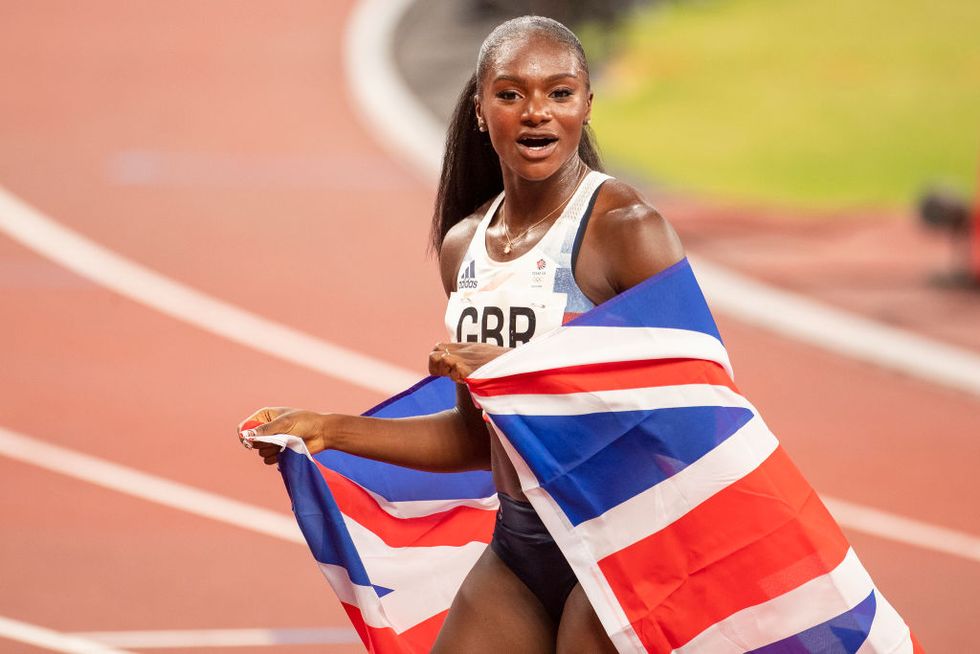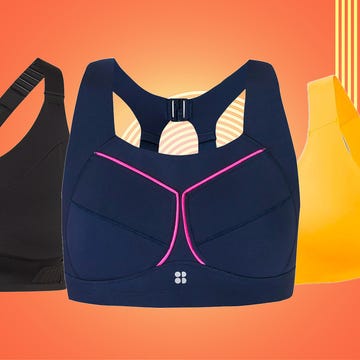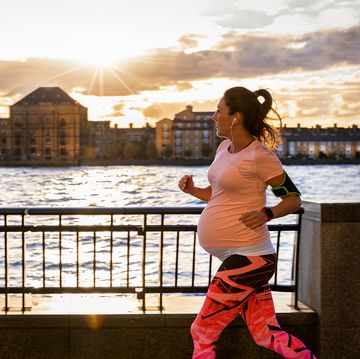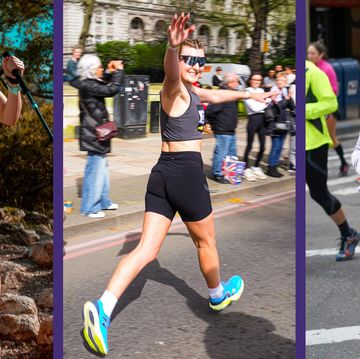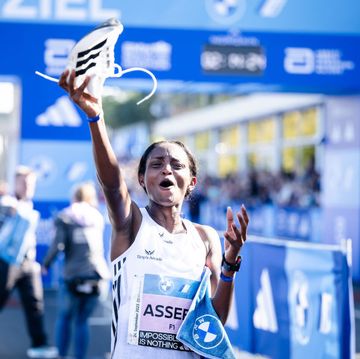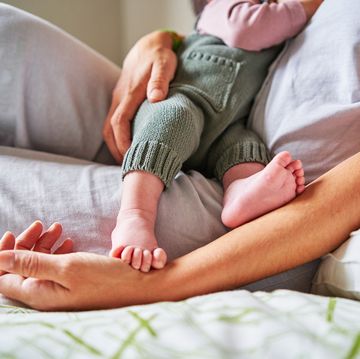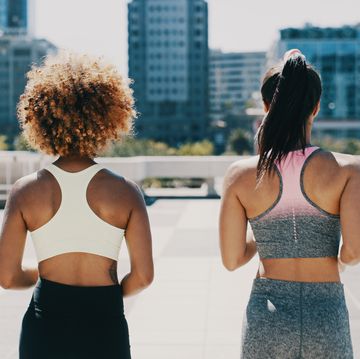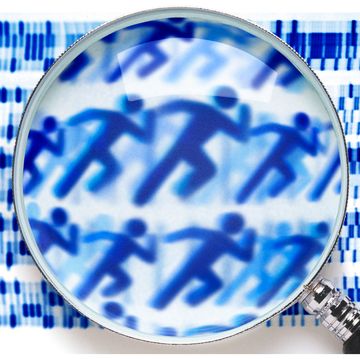Are you the type of runner who schedules your training around your period? Do you flat-out refuse to run on your period and hide under the duvet instead? Or do you simply not care, pull on a pair of period pants and off you go?
Whatever type of runner you are, there are actually many benefits to running on your period (hello, endorphins). But, first, here’s how your period can affect your running performance...
Runners World, Part of the Hearst UK Wellbeing Network?
Updated: 30 March 2023 irregular cycle issues, it’s important to look at the effects of menstruation Health & Injuries.
‘There’s actually no evidence to say that periods affect objective running performance – that’s to say, you should be able to run a parkrun, 10k or marathon PB on any day of your menstrual cycle. However, the big caveat around that is, as long as symptoms are managed and you work with the hormonal fluctuations associated with your menstrual cycle,’ says Esther Goldsmith, sports scientist at FitrWoman.
‘Menstrual cycle symptoms are completely normal and most females will experience them at some point in their lives – from cramps, to mood changes, to cravings, to lower back pain – they can affect everyone from the elite athlete to the fair-weather runner.’
Last summer, Dina Asher-Smith called for more research into the effects of periods on performance, after her cycle caused her to pull up with cramp during Munich 2022. And Eilish McColgan has also spoken about the excruciating cramps she used to suffer every month. Yet whether you're an elite athlete or not, if you’re a woman and still have a monthly bleed, chances are you'll need to manage your symptoms so your period doesn’t affect your running.
‘Through understanding your body, tracking your periods and symptoms, and then making small changes in nutrition or lifestyle, you can mitigate against negative symptoms that you might experience so that you can perform to your best on any given day,’ says Goldsmith.
So should you avoid running during your period?
‘In a word – no. Despite the symptoms listed above, it’s not all bad,’ says British long-distance runner, Jo Pavey.
Goldsmith agrees: ‘While you may well feel lethargic or in pain or embarrassed when you’re on your period, we know that moderate-intensity exercise can actually be really beneficial for any symptoms as it has an anti-inflammatory effect and triggers a great release of endorphins. Medically, the only thing to be aware of is that if you are a heavy menstrual bleeder, you may become slightly iron-deficient through heavy blood loss, so having an iron-rich diet and potentially speaking to your doctor may be necessary to counteract the effects of low iron.’
Paula Radcliffe famously broke the world record in Chicago in 2002 after suffering period cramps throughout the last third of the race. Uta Pippig also famously won the Boston Marathon in 1996 with blood pouring down her leg as she crossed the finish line. And according to 14-time marathoner and gynaecologist Julie Levitt, many women score personal bests when running during their periods.
‘During your period – whether it comes on its own or by taking your birth control placebo pills – your body’s levels of estrogen and progesterone are at their lowest, making you more neutral/androgynous/manly, biologically speaking,’ says Levitt. ‘Your body knows it’s not getting pregnant, so its systems aren’t focused on making your uterus into an incubator. Your body can do things other than make babies – including run. Your body’s better able to convert carbs into energy, keep you from overheating, and help you recover.’
‘But during the hours immediately before and after your period starts, your uterus is busy churning out prostaglandins, compounds that make your uterine muscles contract (cramp) and force out your endometrial lining,’ says Levitt. Whatever your hormonal advantage, it’s hard to just power through all of that.
irregular cycle issues?
of the best womens running shorts for summer:
1. If you wake up with period cramps on race day, try the following. According to Levitt, increasing your core temperature, will speed up your body’s breakdown of these inflammatory compounds. ‘This will also increase your circulation and production of pain-killing endorphins to help ease your pain.’
2. Women gain more benefit from super shoes than men. If you get your period on race day, make sure you hydrate and get some form of iron – as previously mentioned, when you lose blood during your period, you are, in effect, losing fluids, iron, and haemoglobin. ‘Your body’s ability to transport oxygen and other nutrients to your working muscles is reduced, and you risk dehydration,’ says Levitt.
3. Tim Clayton - Corbis. It's so important to feel comfortable, says Goldsmith, so make sure you have everything you need. ‘This might be a menstrual cup or tampons or a pad, but the worst thing would be to turn up to the start line feeling embarrassed and uncomfortable.’
4. Make sure you’re well-fuelled and well-hydrated. In terms of fuelling, be aware that you may have an increased energy demand pre-menstrually, says Goldsmith, and need a few more carbohydrates during menstruation, ‘although, again, that’s very individual’.
Do period hormones mean you might run slower?
During the follicular phase (from the day you stop bleeding to the day you start ovulating – for most women, between days 7-22) your estrogen levels are on the rise. ‘That shift causes your metabolism to use fat, rather than carbohydrates, as its primary energy source,’ says nutrition specialist Marta Montenegro. ‘That makes your pre-race carbo-loading of little benefit. While fats can help fuel low-intensity endurance exercise, without the ability to efficiently convert carbs and glycogen into fast-acting energy, you may feel sluggish and will have trouble kicking it at the end of a race.’
Also, because your body stores three grams of water with every gram of stored carbs – and you aren’t burning those – you begin to retain water during this phase, she says.
‘Then, when you ovulate, your body switches into “let’s get pregnant” mode (the luteal phase) and stays there pretty much until your period hits. During this time, your progesterone levels also begin rising, until it and estrogen hit their peaks. Apart from making you bloated, constipated, emotional, and generally PMS-y – especially in the days just before your period – they make you about as inefficient of a runner as you can be.’
The hormone spike increases your body’s tendency to break down protein — that’s right, muscle — for energy. Meanwhile, your sodium and blood pressure levels rise.
‘Your kidneys redistribute all of that water hanging out in your muscles, making you feel bloated. And, your sweat response becomes delayed, making it easier to become overheated during your race. It becomes harder to work at the same intensity,’ says Montenegro.
But, of course, not everyone will find it harder – or indeed, run slower on their period. ‘I think that it’s important to understand that everyone is an individual, so just because some people might feel great when they are menstruating, others might not,’ says Goldsmith.
‘Hormones affect us all individually – some people might be particularly sensitive to the hormone withdrawal that occurs at the end of the menstrual cycle whereas others might be more affected by the slight increase in baseline inflammation that occurs and the low levels of oestrogen and progesterone during menstruation.’
Goldsmith’s advice? ‘So I would encourage you to try to understand what feels good and what doesn’t in your own body at different times of your cycle. You could even track your cycle alongside your running training to see if there’s any correlation between the two for you.’
Should you avoid long runs if you get your period?
According to Pavey, if you feel lousy during your period, you should be flexible with your training. ‘You should not have to avoid long runs or tough workouts throughout but listen to your body. If you’ve planned a long run, head out with no pressure to do the distance. If you don’t feel good, go shorter and tackle the long run another day.’
Goldsmith agrees: ‘The important thing is to be as in tune with your body as possible. If you feel that a long run will zap all of your energy, and you’d prefer to put it off for a few days, psychologically you might feel that that is the best thing to do (there’s nothing worse than forcing yourself through a long run when you feel miserable). But maybe you need to have a really great high-carb breakfast, grab a running friend to chat with en route, and you might actually feel good once you start.’
And what about tough tempo sessions? Should you avoid those on your period?
Avoid really tough sessions when you’re feeling at your worst, advises Pavey, ‘but you could do some interval work,’ she suggests. ‘You may struggle with longer reps, but try a few shorter efforts, such as a block of easy 200m reps, so you’re not pushing too hard. If you want to include longer reps, do them to time rather than distance, to ensure you don’t overexert yourself.’

